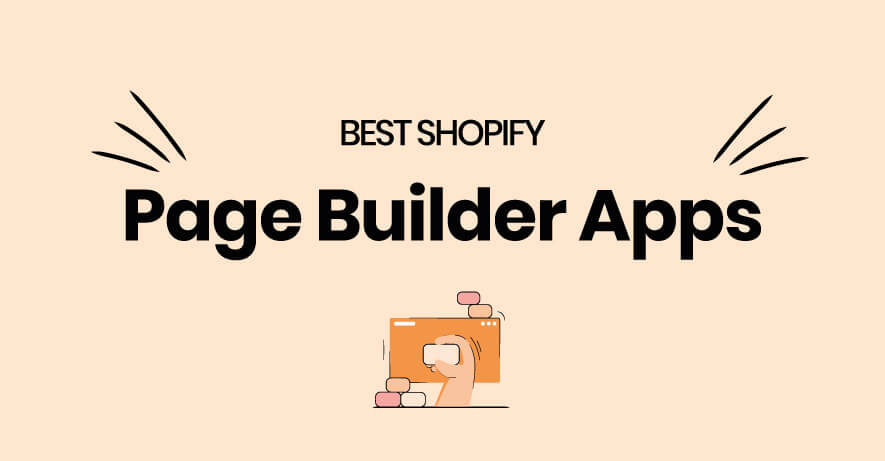Page builders help beginner and experienced Shopify merchants create professional-looking and conversion-oriented pages. While the built-in website builder is powerful, it’s very limited and lacks customization freedom.
Meanwhile, premium Shopify themes lack templates, resulting in many stores with similar designs. Building an eCommerce website with a third-party page builder can help create a unique and data-driven store.
Our team has been in the Shopify app development business for 5+ years, and we’ve tested hundreds of apps already. So, I share my best Shopify page builder list based on our experience and continuous test findings.
Here’s why my insights matter
You can find many Shopify page builders claiming to be the best. So, how do you know that my review is unbiased? Our team and I meticulously test hundreds of Shopify apps each year, documenting their features, updates, performance, price fluctuations, and more. Here’s a transparent overview of how I selected this best page builder list:
- Experience. With the help of my team, I’ve tested dozens of page builders on Shopify to find the top ones. I reviewed the features they offer, ease of use, and template selection, and tested their SEO audit and AI automation tools.
- Hands-on testing. I tested whether page builders compromised performance using Google Lighthouse. I compared the page load time and performance scores of the pages created with my Shopify theme and the pages I created with the page builders on my test store.
- Data-driven comparisons. I created a sheet comparing the offered features and various test results to find out which Shopify page builders offered the best price-to-value ratio.
Page builders compared
Here’s a quick overview of the best Shopify page builders that I’ve tested:
| Optimized for SEO | HTML editing | Templates | AI features | Free plan | Pricing | |
| PageFly | ✅ Yes | ✅ Yes | 120+ | No | Yes | From $24/month |
| GemPages | ✅ Yes | ✅ Yes | 400+ | Image to Layout | Yes | From $29/month |
| EComposer | ✅ Yes | ✅ Yes | 100+ | AI content generator | Yes | From $19/month |
| Shogun | ✅ Yes | ✅ Yes | 70+ | No | No | From $39/month |
| LayoutHub | ✅ Yes | ❌ No | 150+ | No | Yes | From $14.99/month |
| AfterShip | ✅ Yes | ❌ No | 40+ | No | Yes | From $35/month |
| Beae | ✅ Yes | ✅ Yes | 150+ | No | Yes | From $19.99/month |
| Zipify | ✅ Yes | ❌ No | 110+ | AI content generator | No | From $19/month |
| Foxify | ✅ Yes | ✅ Yes | 200+ | AI content translator and generator | No | From $1/month |
| Tapita | ✅ Yes | ✅ Yes | – | AI content and image generator | Yes | Free |
My tests revealed that PageFly is the most comprehensive page builder out there, offering excellent performance, advanced features, and best price-to-value ratio. Let’s get into detailed reviews of each page builder and my findings.
1. PageFly – best Shopify page builder in 2026

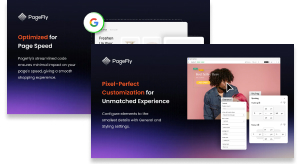
I chose PageFly as the best page builder for Shopify because of its extensive template selection and exceptional analytics features for conversion optimization. It’s a top solution for building responsive pages on any device, including mobile.
Why I picked it:
PageFly comes with an intuitive drag-and-drop builder that’s loaded with 120+ templates (even event-based designs). It’s one of the most customizable builders I’ve tested, allowing me to optimize even the smallest details without coding.
Plus, PageFly is focused on conversion optimization. You can connect your Google Analytics account to track analytics, set up A/B tests to find what page versions generate the most sales, or perform an SEO audit.
You can try PageFly with all of its features for one page or section for free. The paid plans start from $24/month for 5 published slots.
Who it’s for:
I’d recommend PageFly for conversion-oriented Shopify stores that want to create a data-driven website design. With a large template selection and drag-and-drop editor, it’s excellent for both beginners and more experienced users.
Find out more in our PageFly review.
2. GemPages – conversion-focused Shopify page builder

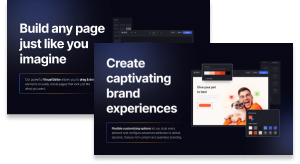
GemPages is a versatile page builder app for Shopify merchants who want to leverage 400+ templates to quickly build a high-converting store.
Why I picked it:
I picked GemPages because it offers unique features for conversion rate optimization (CRO). You can create sales funnels and analyze their conversions, average order value, and more.
Additionally, I enjoyed its AI-powered Image to Layout feature. Once you upload an image, GemPages will turn it into customizable sections.
A slight disadvantage for me was that GemPage isn’t built for Shopify, meaning you’ll be customizing pages on a separate site. If you want an app that allows you to fully edit pages on Shopify, I’d recommend trying PageFly.
You can test GemPages on 1 page for free, or get a paid plan from $29/month for unlimited pages.
Who it’s for:
I’d recommend GemPage for medium-sized stores that need a large template library. It’s a page builder that helps optimize your Shopify store for conversions and engagement while designing fully responsive pages.
Learn more in our GemPages review.
3. EComposer – beginner-oriented page builder for Shopify

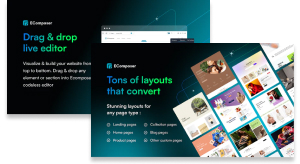
EComposer is a great page builder for Shopify that caters to beginner users. Its drag-and-drop builder and 100+ templates make it a great solution for those who are just starting out.
Why I picked it:
I like how intuitive EComposer is, as the setup was clear and guided me through all the steps to get started. The editor didn’t feel that much different from Shopify’s, so it didn’t take me long to learn it.
You can also run an SEO audit on any page or leverage the AI content generator to automate content creation.
However, I lacked features like A/B testing that would help optimize page conversions. If that’s what you’re looking for, I’d give PageFly a go instead.
You can try EComposer for free on 1 page or get a premium plan from $19/month for 15 slots.
Who it’s for:
I suggest EComposer for Shopify startups that want a quick setup for premium-looking pages. It’s beginner-friendly, offers unique features like an AI content generator, and is made to save time.
4. Shogun – intuitive Shopify page builder for analytics

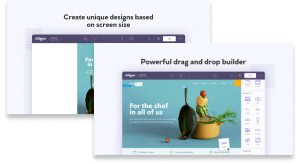
Shogun is a drag-and-drop page builder for Shopify stores that balances analytics, simple navigation, and personalization.
Why I picked it:
I chose Shogun for this list because it covers all bases. For starters, there are plenty of unique elements, from Instagram embeds to carousels. You get to choose from over 70 templates to get started quicker.
Shogun is also a data-driven builder. You can easily run A/B tests or check conversions, sales, page views, and other statistics using page analytics.
Unlike builders like PageFly or EComposer, Shogun is suitable for people who don’t mind working outside of Shopify Admin. You can get Shogun starting from $39/month for 25 pages. While there’s no free plan, you can try it out with a free 10-day trial.
Who it’s for:
I’d recommend Shogun for eCommerce sites focused on creating custom pages and analytics. While on the pricier side, it’s an intuitive drag-and-drop builder suitable for large businesses.
5. LayoutHub – budget-friendly page builder

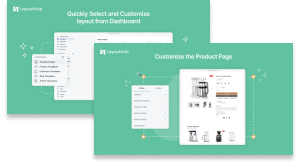
LayoutHub is a highly customizable page builder that Shopify stores can use to create pages with great performance on any device.
Why I picked it:
I liked that LayoutHub comes with 150+ templates which I found modern, intuitive, and professional-looking. It’s highly responsive and suitable for creating mobile pages with great user experience.
What I didn’t enjoy was the lack of analytics or testing features that you get with other page builders, like PageFly or Shogun. But you do get sales tools and even a lazy loading feature for ensuring faster page load times.
Although it’s unavailable on trial or development stores, the free plan offers 3 published pages. Meanwhile, the paid plans start from $14.99/month for 10 pages.
Who it’s for:
I’d suggest getting LayoutHub for small businesses on a budget that wants to create something more custom than traditional Shopify themes. It’s highly customizable and offers excellent customer support in case you need assistance.
6. AfterShip – simple page builder for small Shopify stores


AfterShip is a page builder for simple customizations to elevate your pages beyond basic templates and is optimized for the best user experience.
Why I picked it:
AfterShip offers 40+ templates for specific holidays, product pages, collections, blogs, and more. There’s also built-in lazy loading to boost page load time and analytics for examining visitors, clicks, and more.
However, I found it not as highly customizable as other page builders, like PageFly or GemPages. You can change background images, add SEO metadata, choose content width, padding, alignment, and more. I couldn’t locate an option to add custom CSS.
You can try the AfterShip page builder for free on 1 page, or get the paid plan from $35/month for 25 pages.
Who it’s for:
I suggest AfterShip Page Builder for small stores that want to build a modern website with sales-oriented tools.
7. Beae – versatile builder for aesthetic pages

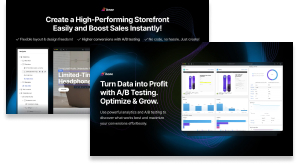
Beae page builder is a premium option that helps turn your site visitors into loyal customers using CRO-oriented features and analytics.
Why I picked it:
I liked that Beae offers conversion-oriented features, like sales banners, cross-selling, and a countdown timer. You can easily connect your Google Analytics account and run A/B tests to find out which page versions get you more sales.
As for the editor, it’s an easy drag-and-drop solution that even beginners won’t have trouble figuring out. You can review your page with a simple SEO audit, too. What I didn’t like was that I couldn’t locate a field to add custom CSS.
Beae prices start from $19.99/month for 10 pages. However, you can try the free plan for publishing 1 page.
Who it’s for:
I recommend Beae to Shopify merchants who want a page builder with aesthetic templates. It offers modern designs while also equipping you with tools for analytics.
8. Zipify – page builder with an AI content creator


Zipify is a page builder for Shopify that helps set up a store quickly by automating page creation with AI-powered tools and multi-assigning products.
Why I picked it:
What’s unique about Zipify is that it offers an AI copywriter, letting you save time on writing product descriptions. Plus, you can view Zipify’s statistics, including average order value, conversion rates, and page views, without connecting a Google Analytics account.
My only drawback is that the app advertises a free plan, but it’s actually a 14-day trial. If you need a free plan, I’d suggest looking into PageFly instead.
Meanwhile, if Zipify feels right for you, the pricing starts from $19/month for 5 landing, 1 product, and 1 blog page.
Who it’s for:
I’d recommend Zipify for merchants looking to create professional pages quickly. It allows publishing universal product pages to save time and offers loads of templates to choose from.
9. Foxify – responsive page builder for any device


Foxify is a page builder created for Shopify stores that are visual-content focused and want to automate content creation.
Why I picked it:
Foxify comes with over 200 templates for different industries that can be customized for different devices. It comes with AI-powered features, like Fox Magic that allows creating and translating content in seconds.
With this app, you can also review analytics, such as impressions, sales, or average order value, to gain insights into your store’s performance.
Yet, keep in mind that there’s no free plan. You can publish 3 pages using the $1/month plan. For 25 pages or more, the prices start from $19/month.
Who it’s for:
I’d suggest Foxify for medium to large Shopify stores that are serious about creating truly unique pages. The app comes with plenty of extensions, like Ajax cart or related products, and AI-enhanced features to automate tasks.
9. Tapita – AI-powered blog page builder for Shopify

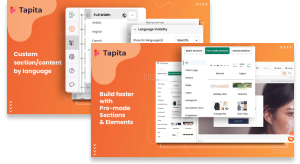
Tapita is a blog-focused builder for Shopify that balances SEO optimization, AI generation, and conversion boosting.
Why I picked it:
I chose Tapita for this list because it’s a great builder for stores that are highly focused on their blog presence. It extends beyond the limited Shopify blog functionalities and lets you customize various elements and add product cards, quotes, and more.
You can even customize SEO metadata, URL handle, and run an SEO audit. Plus, there are AI-powered features, such as generators for images and content.
Yet, note that this is a blog page builder only. So, if you need a traditional page builder, look into PageFly or other apps on this list. On the bright side, Tapita AI SEO blog builder is completely free to use.
Who it’s for:
I’d recommend Tapita blog builder for any Shopify store that wants to enhance their blog posts. It’s an intuitive builder that lets you automate content creation and save time.
What is a Shopify page builder app?
A Shopify page builder app is a tool that allows creating custom pages without any coding. It comes with a wide selection of templates, AI automation, analytics, and more customization freedom.
Most page builder apps come with a drag-and-drop editor, letting you easily organize various elements and immediately see how it will look on any device. It’s a beginner-friendly option that’s also highly appreciated by design-savvy users.
What to look for in a Shopify page builder?
When choosing a Shopify page builder, weighing your financial capabilities and considering your needs is important. Find some guiding criteria to follow below:
- User-friendly page editor. Your page builder will be your workspace, meaning you must be comfortable with using it. Pick a Shopify page editor that looks the easiest to use.
- Suitable templates. A good template can give you a great head start. Choose a Shopify page builder with a large template selection to help turn your vision into reality.
- AI automation. Some page builders come with AI-powered features, such as content generation or image to layout. Take into consideration what you could use to automate your page-building process.
- Analytics features. Some page builders offer advanced analytics of your page performance, such as page views, average order value, or sales. Apps like PageFly even offer A/B testing to find which page version gets more sales.
- Good customer support. This might be an afterthought but it won’t be if you’ll end up facing issues. Choose an app that offers around-the-clock customer support.
- Pricing. It’s always important to consider if the page builder you’re about to get goes hand-in-hand with what you can afford or if the service offers an excellent price-to-quality ratio.
Why should you use a page builder for Shopify?
Still not sure whether you should use a page builder for your Shopify site? Here are some of the reasons why more and more shop owners are adding these apps to their must-buy lists:
- Solid editing tools. Shopify’s stock builder is fine, but it’s no match to custom page builders. With them, you’re not stopped by limited customizations and can make the website truly unique.
- No coding is required. This is one of the core Shopify truths – you either build your site with a template or roll your sleeves up and learn coding. Page builders offer the third way, letting you make fully custom sites with no coding knowledge required.
- Better value. Shopify page builders come with hundreds of templates included free of charge. Meanwhile, one Shopify theme can cost anywhere from $50 to $200 and offers just a few different styles.
Summary
There’s no one best Shopify page builder for everyone – but PageFly comes very close to that title. With custom templates and elements made for various purposes, it’s a great solution if you’re looking to grow your website and your business.
If you’re still not sure which page builder to pick, make sure to give them a shot: most of the options here come with either a free plan or a free trial you can use. See their features, try out their different and exciting page editors, and see the world beyond Shopify’s stock solutions.
Frequently asked questions
Yes, Shopify is a drag-and-drop builder suitable for beginners. However, it’s not as customizable as third-party Shopify page builders like PageFly, which gives you more design freedom without coding.
The best free Shopify page builder is PageFly. It comes with a beginner-friendly interface and a generous free plan that offers all features for publishing 1 page.
Shopify themes create a foundational design for your store, while page builders provide you with more customization freedom. You can add different sections, leverage sales-boosting tools, and analyze which designs work best with A/B tests.
Shopify website builder is great for basic customizations and creating a simple website. Meanwhile, if you need more advanced customizations, a third-party Shopify page builder gives you more design freedom and equips you with hundreds of templates.
